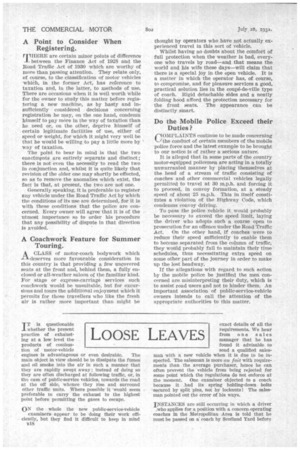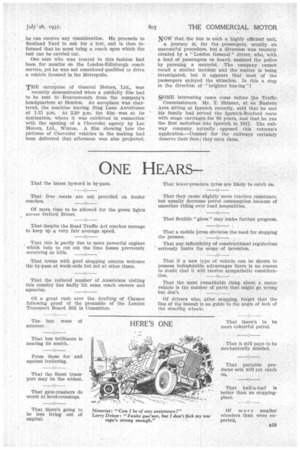LOOSE LEAVES
Page 36

Page 37

If you've noticed an error in this article please click here to report it so we can fix it.
IT is questionable whether the present practice of exhausting at a low level the products of combustion of motor-vehicle engines is advantageous or even desirable. The main object in view should be to dissipate the fumes and oil smoke into the air in such a manner that they are rapidly swept away ; instead of doing so they are often discharged at following traffic, or, in the case of public-service vehicles, towards the road at the off side, whence they rise, and surround other traffic units. Where possible it would seem preferable to carry the exhaust to the highest point before permitting the gases to escape.
ON the whole the new public-service-vehicle
examinersappear to be doing their work efficiently, but they find it difficult to keep in mind 1318 exact details of all the requirements. We hear from one sales manager that he has found it advisable to send a qualified sales man with a new vehicle when it is due to be inspected. The salesman is more au fait with requirements than the average purchaser, hence he can often prevent the vehicle from being rejected for some point which the regulations do not enforce at the moment. One examiner objected to a coach because it _had its spring holding-down bolts "secured by split 'pins, not by locknuts I The salesman pointed out the error of his ways.
• INSTANCES are still occurring in which a driver
who applies for a position with a concern operating coaches in the Metropolitan Area is told that he must be passed on a. conch by Scotland Yard before he can receive any consideration. He proceeds to Scotland Yard to ask for a• test, and is then informed that he must bring a coach upon which the test can be carried out.
One man who was treated in this fashion had been for months on the London-Edinburgh coach service, yet he was not considered qualified to drive a vehicle licensed in the Metropolis.
THE enterprise of General Motors, Ltd., was recently demonstrated when a publicity film had to be sent to Bournemouth from the company's headquarters at Hendon. An aeroplane was chartered, the machine leaving Stag Lane Aerodrome at 1.15 p.m. At 2.30 p.m. the film was at its destination, where it was exhibited in connection with the opening of a Chevrolet agency by Lee Motors, Ltd., Winton. A film showing how the pictures of Chevrolet vehicles in the making had been delivered that afternoon was also projected. NOW that the bus is such a highly efficient unit, a journey is, for the passengers, usually an uneventful procedure, but a diversion was recently created by a "London General" driver, who, with a load of passengers on board, assisted the police by pursuing a motorist. The company cannot recall a similar incident and the matter is being investigated, but it appears that most of the passengers enjoyed the situation. Is this a step in the direction of "brighter bus-ing "1 SOME interesting cases come before the Traffic Commissioners. Mr. T. Skinner, at an Eastern Area sitting at Ipswich recently, said that he and his family had served the Ipswich-Boxford route with stage carriages for 60 years, and that he ran the first motorbus into Ipswich in 1912. The railway company actually opposed this veteran's application—Counsel for the railways certainly deserve their fees ; they earn them.




































































































